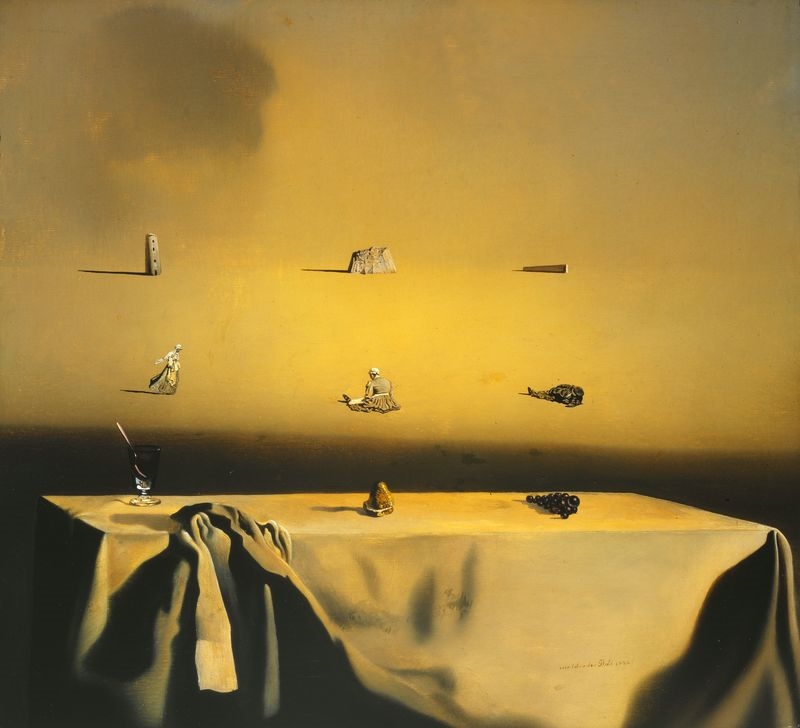Museum of Fine Arts, Boston (MFA)
July 6 through December 1, 2024

Salvador Dalí, The Disintegration of the Persistence of Memory (detail), 1952–54. Oil on canvas. Collection of the Dalí Museum. Gift of A. Reynolds and Eleanor Morse. © 2024 Salvador Dalí, Fundació Gala-Salvador Dalí, Artists Rights Society.
The outlandish and iconoclastic artist Salvador Dalí (1904–1989) is famous for his bizarre imagery, eccentric behavior and unparalleled technical skill. The renowned Surrealist was also, however, deeply rooted in tradition. He revered his artistic predecessors—among them Dürer, Raphael, El Greco, Vermeer and above all Velázquez.
Opening this summer, the first-ever exhibition of work by Dalí at the Museum of Fine Arts, Boston (MFA) examines this sustained engagement with European art of the past. Dalí: Disruption and Devotion presents nearly 30 paintings and works on paper on loan from the Salvador Dalí Museum in St. Petersburg, Florida, as well as books and prints from a private collection, which are shown alongside works from the MFA’s European collection made by artists who inspired him. The unique juxtapositions, presented in both pairings and small thematic groupings, offer a new take on one of the most celebrated artists of the 20th century.
Dalí spent his youth in the small Spanish town of Figueres, north of Barcelona near the Catalan coast. His artistic talent was noticed early on, and at 18, he enrolled at Madrid’s San Fernando Royal Academy of Fine Arts. On a trip to Paris in 1929, Dalí connected with the Surrealist group through another Catalan artist, Joan Miró. In the words of the group’s leader, André Breton, Surrealism aimed to “resolve the previously contradictory conditions of dream and reality into an absolute reality, a super-reality.” The unconscious mind was first explored in literature, but the movement soon expanded to the visual arts, with Dalí a highly visible member of the circle.
“The Surrealist movement, announced by André Breton in 1924, is 100 years old. The MFA’s exhibition, using superb loans from the Salvador Dalí Museum in St. Petersburg, Florida, offers a timely opportunity to reconsider the most famous Surrealist in terms of the historical artists he deeply admired,” said Frederick Ilchman, Chair and Mrs. Russell W. Baker Curator of Paintings, Art of Europe.
Dalí: Disruption and Devotion showcases a broad range of Dalí’s best-known works, in terms of subject matter, chronology and scale. Highlights include:
- The Disintegration of the Persistence of Memory (1952–54), a reworking of Dalí’s single most famous picture, painted two decades earlier, which shows his preoccupation with the elasticity of time
- The 10-foot-tall Ecumenical Council (1960), which includes art historical references, religious themes, elements from earlier works and a hyper-realistic self-portrait in the lower left corner
- Velázquez Painting the Infanta Marguerita with the Lights and Shadows of His Own Glory (1958), paired with Velázquez’s Infanta Maria Theresa (1653) to demonstrate Dalí’s deep reverence for the 17th-century Spanish painter
- Morphological Echo (1936) and Nature Morte Vivante (Still Life-Fast Moving) (1956), examples of how Dalí distorted and riffed upon 17th-century Dutch and Flemish still lifes
- Four of Dalí’s reinterpretations of Francisco Goya’s Los Caprichos (1799), one of the greatest print series of European art, which include detailed embellishments and revised captions, shown facing Goya’s original etchings
- Sainte Hélène à Port Lligat (1956), presenting Dalí’s wife and muse Gala in the guise of Roman Emperor Constantine’s mother Saint Helena, which is paired with El Greco’s Saint Dominic in Prayer (about 1605) to show both artists meditating on solitude and the power of spiritual experience

Old Age, Adolescence, Infancy (The Three Ages), 1940
Salvador Dalí (Spanish, 1904–1989)
Oil on canvas
* Collection of The Dalí Museum, St. Petersburg, FL (USA); Gift of A. Reynolds & Eleanor Morse
* Courtesy Museum of Fine Arts, Boston
Infanta Maria Theresa, 1653
Diego Rodríguez de Silva y Velázquez (Spanish, 1599–1660)
Oil on canvas
* Gift of Charlotte Nichols Greene in memory of her father and mother, Mr. and Mrs. Howard Nichols
* Photograph © Museum of Fine Arts, Boston
Velázquez Painting the Infanta Marguerita with the Lights and Shadows of His Own Glory, 1958
Salvador Dalí (Spanish, 1904–1989)
Oil on canvas
* Collection of The Dalí Museum, St. Petersburg, FL (USA); Gift of A. Reynolds & Eleanor Morse
* Courtesy Museum of Fine Arts, Boston
Shades of Night Descending, 1931
Salvador Dalí (Spanish, 1904–1989)
Oil on canvas
* Collection of The Dalí Museum, St. Petersburg, FL (USA); Gift of A. Reynolds & Eleanor Morse
* © 2024 Salvador Dalí, Fundació Gala-Salvador Dalí, Artists Rights Society
* Courtesy Museum of Fine Arts, Boston
Nature Morte Vivante (Still Life‑Fast Moving), 1956
Salvador Dalí (Spanish, 1904–1989)
Oil on canvas
* Collection of The Dalí Museum, St. Petersburg, FL (USA); Gift of A. Reynolds & Eleanor Morse
* © 2024 Salvador Dalí, Fundació Gala-Salvador Dalí, Artists Rights Society
* Photo © Daniel Portnoy, 2023
* Courtesy Museum of Fine Arts, Boston
Oeufs sur le Plat sans le Plat, 1932
Salvador Dalí (Spanish, 1904–1989)
Oil on canvas
* Collection of The Dalí Museum, St. Petersburg, FL (USA); Gift of A. Reynolds & Eleanor Morse
* © 2024 Salvador Dalí, Fundació Gala-Salvador Dalí, Artists Rights Society
* Photo © David Deranian, 2021 |
* Courtesy Museum of Fine Arts, Boston
The Ecumenical Council, 1960
Salvador Dalí (Spanish, 1904–1989)
Oil on canvas
* Collection of The Dalí Museum, St. Petersburg, FL (USA); Gift of A. Reynolds & Eleanor Morse
* © 2024 Salvador Dalí, Fundació Gala-Salvador Dalí, Artists Rights Society
* Photo © Doug Sperling and David Deranian, 2021 |
* Courtesy Museum of Fine Arts, Boston
Morphological Echo, 1936
Salvador Dalí (Spanish, 1904–1989)
Oil on wood panel
* Collection of The Dalí Museum, St. Petersburg, FL (USA); Gift of A. Reynolds & Eleanor Morse
* © 2024 Salvador Dalí, Fundació Gala-Salvador Dalí, Artists Rights Society
* Courtesy Museum of Fine Arts, Boston









